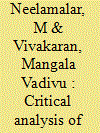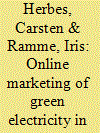| Srl | Item |
| 1 |
ID:
170631


|
|
|
|
|
| Summary/Abstract |
Jihadism’ (also known as the jihadi movement) is a popular term that signifies the Islamic terror movement which thrives on extremist ideologies and violence. In addition to the conventional practices, the online medium is currently being employed for disseminating these extremist ideologies across the globe. Radicalisation and recruitment of geographically dispersed individuals as ‘jihadists’ for supporting Islamic terror activities tend to be the primary intent for using the digital platforms as the medium of communication in this context. One such initiative by the Lashkar-e-Taiba of Jammu and Kashmir was the release of the ‘Wyeth: The Resistance in Flow’, an e-magazine which was launched on April 2018. The first issue which was posted with an open access option was primarily designed to influence the Indian youth population through the radical interpretations of Islam. Hence, it is crucial to analyse and understand the jihadi discourse of the Wyeth magazine in order to curb and counter-attack such initiatives at its initial phase. For this purpose, the present study aims to examine the content of the Wyeth magazine and analyse the basic traits of the jihadi propaganda and its potential to aid in the self-radicalisation process.
|
|
|
|
|
|
|
|
|
|
|
|
|
|
|
|
| 2 |
ID:
127906


|
|
|
|
|
| Publication |
2014.
|
| Summary/Abstract |
There is an increasing body of research on consumer preferences concerning electricity from renewable resources. The purpose of this study is to analyze how providers' online marketing in one of the most developed markets for green energy can be improved. We conducted a content analysis of nearly 480 providers' websites, examining as many as 620 products. We found that energy providers' communication seems to be in line with academic research on potential customer benefits (utilitarian benefits, "warm glow", nature experience). However, communication could be improved by giving more detailed information on the impact of the consumer's decision, e.g. by giving numbers on CO2-emissions saved. Moreover, providers could improve the effectiveness of their visual messages by using more pictures related to renewable energy. Further, self-expressive benefits of buying green energy could be created by offering merchandise articles symbolizing the contribution a consumer makes by choosing a green tariff. When comparing purely green energy providers to other providers, we found that the former offer a wider choice as well as more products supporting new renewable installations. Important implications for policy makers aiming to phase out alternative energy subsidies emerge from our findings.
|
|
|
|
|
|
|
|
|
|
|
|
|
|
|
|